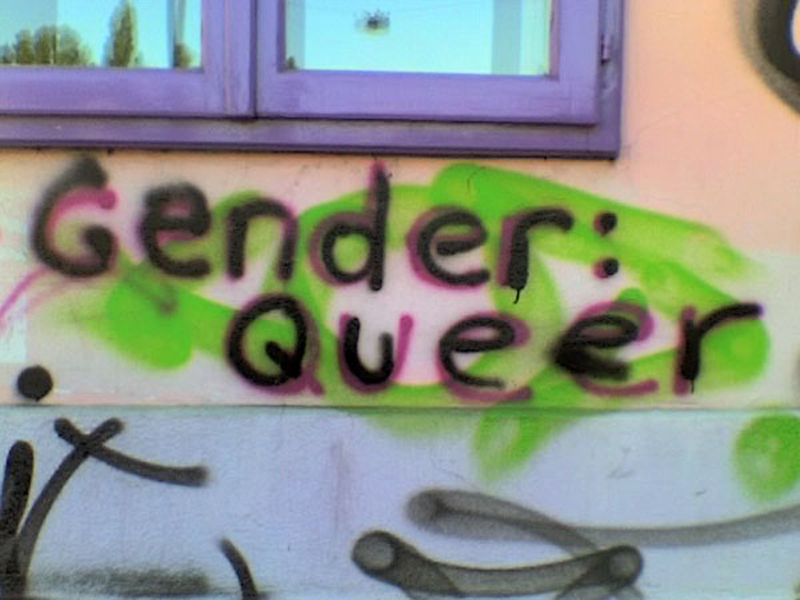It is becoming increasingly common to hear the word “gender” in our daily lives. Whether on TV, in the newspapers or on social media platforms, everyone at some point is confronted with it.
But what does gender actually mean? What does it imply and how is it part of our everyday actions? Whether people know its meaning or not the truth is that gender influences everyone’s lives.
In the Photo: Gender graffiti – Photo Credits: Charles Hutchins
Every day, when we wake up, most of us don’t even think about gender. We tend to take it for granted. Depending on whether we are a man or a woman, we buy certain types of shoes, accessories and clothes in different sections of the store that we have tried on in separate dressing rooms. We also go to different hairdressers, we use different kinds of beauty products and we use perfumes with different fragrances.
These social agreements are so embedded in our routine and we are so accustomed to them that we have created the misconception of thinking that gender defines itself naturally. As a result, actions that defy the gender norms are seen as outrageous and harmful.
Consequently, seeing gender distinctions as something natural is not only incorrect but leads to inequalities and discrimination. This happens because gender not only shapes the way people behave but also the opportunities and rights given to them. For instance, in many cultures around the world, women have less chances to pursue an education than men and are more likely to suffer from violence. There is also the criminalization, in some societies, of women’s adultery or the criminalization of sex between people with the same gender. But if these acts are unnatural why outlaw them? We don’t have any laws that punish the violations of the universal law of gravity.
If gender was inherently natural, societies wouldn’t need laws that forbid and constrain actions that challenge the gender norms. The reason such laws exist is simply because there is a need to direct people’s behavior in a certain way. Essentially, ideas of what it appropriated to a specific gender define the social relations and actions of individuals and groups.
Therefore, gender differentiation is not natural but rather socially constructed. A person becomes a man or a woman by learning and acting according to preconceived definitions of masculine and feminine. Gender is something that we do rather than something we were born with. We do gender everyday through our behavior and our actions which means that gender is not static and can be re-defined.
Another misconception about gender is to see it as binary. However, it is not exclusively about men and women, as many other forms of non-traditional gender identities exist. For example, some people identify themselves as gender neutral, which means they do not identify with any sort of gender identity. Others consider themselves genderqueer, meaning their gender identity is not included or goes beyond the men and women binary.
As an example, the following short video, made by the model and actress Ruby Rose, portrays an identity that challenges the traditional gender roles and gender identities:
Lastly, it is also important to mind the differences between gender identity and sexual identity (a.k.a. sexual orientation). These two concepts are often put together as one, and while it is true that they may overlap, their meanings are considerably different.
Gender identity relates to an individual’s most intimate perceptions of the self. It is about the way individuals see themselves (e.g. as a woman, a man or neither) and what they call themselves. Additionally, an individual’s gender identity may or may not be the same as the sex that was assigned to them at birth.
In the photo: Ruby Rose.
In contrast, sexual identity relates to one’s romantic, emotional or sexual feelings toward other people. There is a tendency of dichotomous thinking in which sexual orientation is defined as being either heterosexual or homosexual. Yet, many others exist, such as asexuality which refers to a person with no sexual desires or feelings, or pansexuality in which a person feels sexually or romantically attracted to people of any gender.
As all these reveal, gender is not a simple noun. It is something that we do, something that we create. It helps define who we are, and in many cases determines the social hierarchy. As such, whether we understand the gender identity of others or not, what is crucial is to give everyone the freedom to be who they are without judgement or discrimination.
For more information on the topic, please check:
- Connel, R. W. (2003). Gender. Polity.
- Waylen, Georgina; Celis, Karen ; Kantola, Johanna, & Weldon, S. Laurel (2013). The Oxford Handbook of Gender and Politics. New York: Oxford University Press
- Comprehensive list of gender identity and sexual identity terms: https://lgbt.wisc.edu/documents/Trans_and_queer_glossary.pdf













